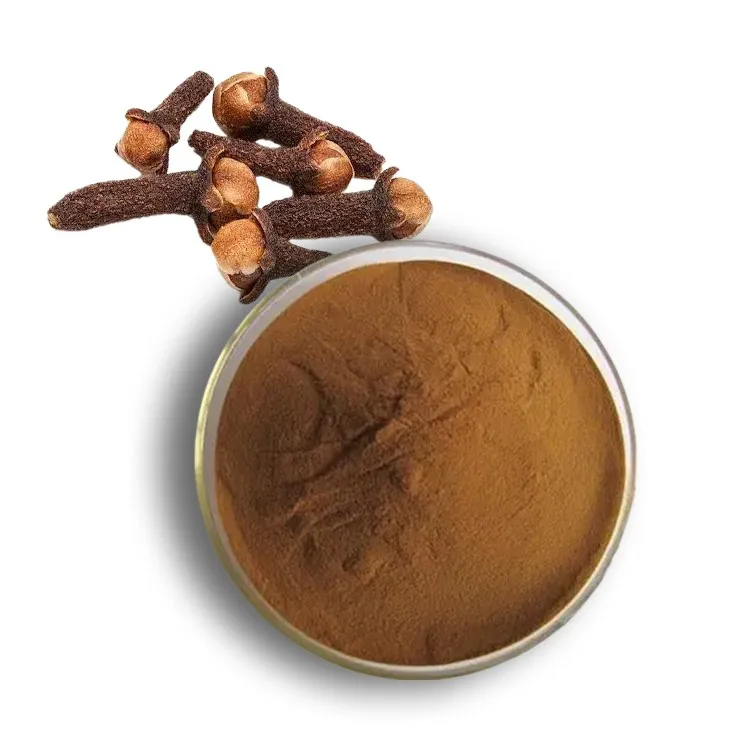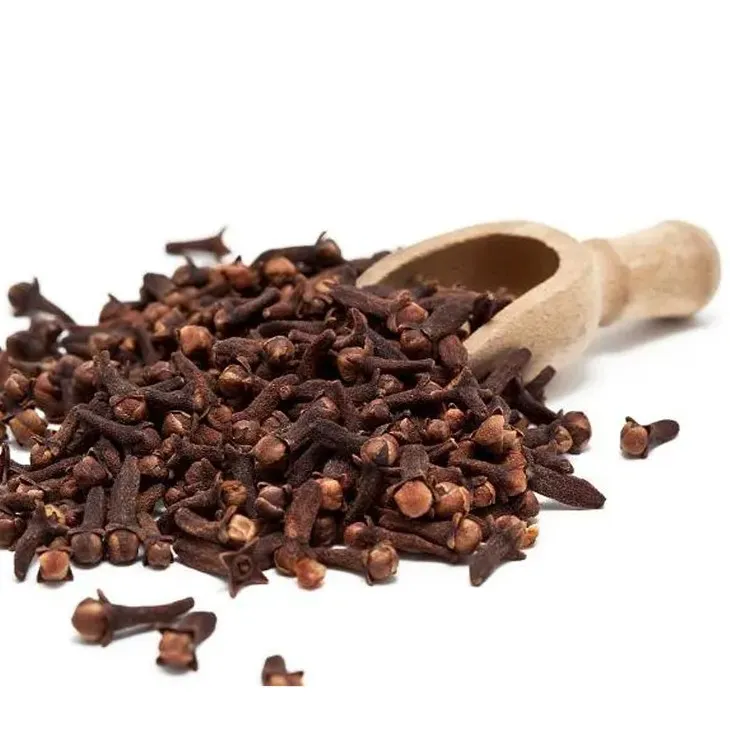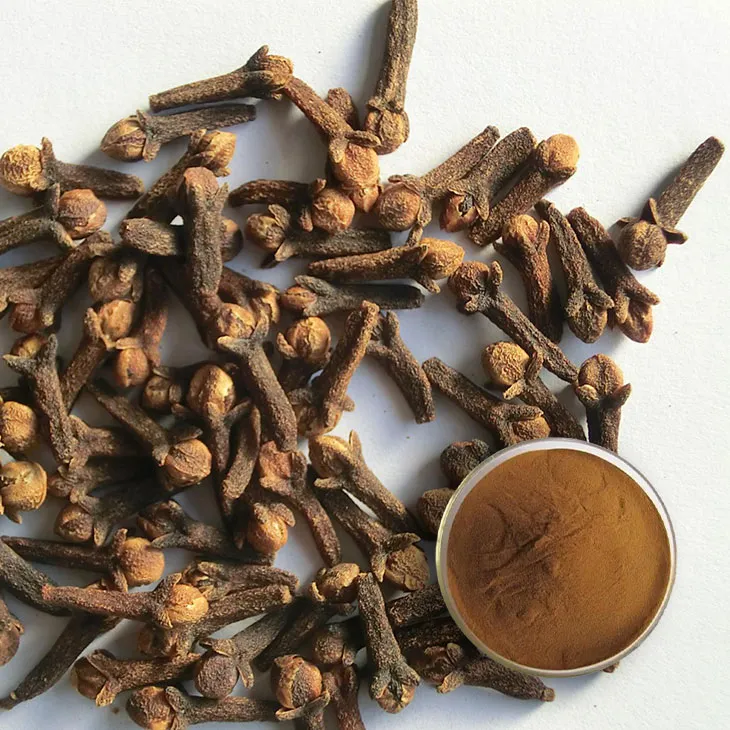- 0086-571-85302990
- sales@greenskybio.com
The Optimal Bioavailability of Clove Powder.
2024-12-01

Introduction
Clove Powder, derived from the dried flower buds of the clove tree (Syzygium aromaticum), has been used for centuries in traditional medicine and cooking. It contains a variety of bioactive compounds such as eugenol, which is known for its antioxidant, anti - inflammatory, and antimicrobial properties. However, in order to fully benefit from these properties, it is crucial to understand and optimize the bioavailability of Clove Powder. Bioavailability refers to the proportion of a substance that enters the circulation and is available at the site of action in the body. This article will explore different aspects related to achieving the best bioavailability of Clove Powder.

Forms of Clove Powder
Whole Clove Powder
Whole clove powder is made by grinding the entire dried clove bud. This form retains most of the natural components of the clove, but it may have lower bioavailability compared to other forms. The intact cell walls in whole clove powder can act as a barrier, preventing the easy release and absorption of its active compounds. For example, when consumed, the digestive enzymes may have difficulty penetrating these cell walls to access the eugenol and other bioactive substances inside.
Ground Clove Powder
Ground clove powder is a more finely ground version. It has a larger surface area compared to whole clove powder. This increased surface area can enhance the interaction with digestive fluids and enzymes, potentially increasing the bioavailability. When ground more finely, the active compounds are more exposed, and the digestive system can more readily break them down and absorb them. However, the grinding process may also cause some loss of volatile compounds if not properly done.
Extract - Based Clove Powder
Extract - based clove powder is made by first extracting the bioactive compounds from cloves using solvents such as ethanol or water, and then drying the extract to form a powder. This form often has a higher concentration of the desired compounds, such as eugenol. Since the extraction process isolates the active components, they are more readily available for absorption. Nevertheless, the use of solvents may introduce some concerns regarding residual solvent levels, and the extraction process may also remove some other potentially beneficial compounds that are present in the whole or ground clove powder.

Consumption with Other Substances
Fat - Soluble Substances
Clove powder contains some fat - soluble compounds, and consuming it with fat - soluble substances can enhance its bioavailability. For instance, when consumed with a small amount of healthy fats like olive oil or coconut oil, the fat can help solubilize the active compounds in clove powder. This is because the cell membranes in the body are made up of lipids, and fat - soluble substances can more easily pass through these membranes. The eugenol and other bioactive components in clove powder can be carried along with the fat, facilitating their absorption into the bloodstream. It is important to note that excessive fat consumption should be avoided, as it can lead to other health problems.
Black Pepper
Black pepper contains piperine, which has been shown to enhance the bioavailability of many substances. When consumed together with clove powder, piperine can inhibit certain enzymes in the liver and intestine that are responsible for metabolizing drugs and other compounds. This inhibition can lead to a higher concentration of the active compounds from clove powder in the body. For example, it can prevent the rapid breakdown of eugenol, allowing more of it to be absorbed and utilized by the body.
Turmeric
Turmeric, with its active compound Curcumin, and clove powder can have a synergistic effect on bioavailability. Curcumin can also enhance the absorption of eugenol from clove powder. Moreover, both turmeric and clove have anti - inflammatory properties, and when consumed together, they may provide enhanced health benefits. The combination may also help in modulating the gut microbiota, which can further influence the absorption and bioavailability of the compounds present in clove powder.

Processing Techniques
Microencapsulation
Microencapsulation is a technique that can be used to improve the bioavailability of clove powder. In this process, the clove powder or its active compounds are encapsulated within a small, protective shell. This shell can protect the active components from degradation in the digestive tract and can also control the release of the compounds. For example, it can be designed to release the clove powder's active ingredients in the small intestine, where absorption is more efficient. Microencapsulation can also improve the solubility of the clove powder in different media, which is beneficial for absorption.
Nano - Processing
Nano - processing involves reducing the size of the clove powder particles to the nanoscale. At this scale, the particles have unique physical and chemical properties. Nano - sized clove powder particles can have a much larger surface area - to - volume ratio compared to their larger counterparts. This increased surface area allows for more efficient interaction with the digestive system, leading to enhanced bioavailability. Additionally, nano - particles can more easily penetrate cell membranes, facilitating the uptake of the active compounds into cells. However, there are also concerns regarding the safety of nano - particles, and more research is needed to ensure their long - term safety in the body.
Fermentation
Fermentation of clove powder can also impact its bioavailability. During fermentation, microorganisms can break down the complex structures in clove powder, making the active compounds more accessible. Fermentation can also produce new metabolites that may have additional health benefits. For example, certain bacteria can convert some of the compounds in clove powder into more easily absorbable forms. Moreover, fermentation can improve the taste and palatability of clove powder, which may encourage increased consumption.
Conclusion
Maximizing the bioavailability of clove powder is essential to fully harness its potential health benefits. By considering the different forms of clove powder, consuming it with appropriate substances, and applying suitable processing techniques, it is possible to optimize the uptake of its active compounds in the body. However, more research is still needed, especially regarding the long - term safety and efficacy of some of the more advanced processing techniques such as nano - processing. In conclusion, understanding the factors that influence the bioavailability of clove powder can empower consumers and health - care providers to make more informed decisions about its use.
FAQ:
What are the different forms of clove powder?
There are mainly raw ground clove powder, which is simply the cloves ground into a powder form. Another form could be encapsulated clove powder, where the powder is put into capsules for easier consumption. There are also potentially processed forms, such as those that have been micronized to a finer particle size, which may affect bioavailability differently.
How does consuming clove powder with other substances impact its bioavailability?
Some substances can enhance the bioavailability of clove powder. For example, if consumed with a healthy fat source, it may improve absorption as some of the beneficial compounds in clove powder are fat - soluble. On the other hand, certain substances may inhibit absorption. For instance, some medications or strong stimulants might interact and reduce the body's ability to uptake the active components in clove powder.
What are the potential processing techniques to increase the bioavailability of clove powder?
One potential technique is micronization, which reduces the particle size of the powder. Smaller particles have a larger surface area, which can potentially increase the rate and extent of absorption in the body. Another technique could be enzymatic treatment. Enzymes can break down certain components in the clove powder into more easily absorbable forms. Additionally, heat treatment under specific conditions might also modify the structure of the compounds in clove powder to enhance their bioavailability.
Are there any side effects associated with maximizing the bioavailability of clove powder?
When trying to maximize the bioavailability of clove powder, there could be potential side effects. Clove contains eugenol, and in excessive amounts, it can cause irritation in the digestive tract, leading to symptoms like nausea, vomiting, or diarrhea. Also, if combined with other substances to increase bioavailability in an improper way, it may lead to unexpected interactions, especially for people with pre - existing health conditions or those taking medications.
How can one determine if they are achieving optimal bioavailability of clove powder?
It is quite difficult to directly determine the optimal bioavailability of clove powder in a home setting. However, some indirect signs can be observed. If one notices an improvement in the expected health benefits associated with clove powder, such as reduced inflammation (if that is the purpose of consumption), or improved digestion (as clove has some digestive properties), it could be an indication that the body is absorbing and utilizing the powder effectively. Another way could be through laboratory tests, but this is not practical for most individuals. Monitoring for any adverse effects can also be a way to assess. If there are no negative reactions and the expected positive effects are present, it may suggest a relatively good level of bioavailability.
Related literature
- Bioavailability of Spice Compounds: A Review"
- "Clove (Syzygium aromaticum): A Comprehensive Review on its Phytochemistry, Pharmacology, and Nutritional Importance"
- "Enhancing Bioavailability in Herbal Medicines: Approaches and Significance"
- ▶ Hesperidin
- ▶ citrus bioflavonoids
- ▶ plant extract
- ▶ lycopene
- ▶ Diosmin
- ▶ Grape seed extract
- ▶ Sea buckthorn Juice Powder
- ▶ Beetroot powder
- ▶ Hops Extract
- ▶ Artichoke Extract
- ▶ Reishi mushroom extract
- ▶ Astaxanthin
- ▶ Green Tea Extract
- ▶ Curcumin Extract
- ▶ Horse Chestnut Extract
- ▶ Other Problems
- ▶ Boswellia Serrata Extract
- ▶ Resveratrol Extract
- ▶ Marigold Extract
- ▶ Grape Leaf Extract
- ▶ blog3
- ▶ blog4
-
The best lemon juice powder in nature.
2024-12-01
-
Organic Vitamin K2 Powder Suppliers
2024-12-01
-
Bulk purchase of L - tyrosine.
2024-12-01
-
Vitamin K2 Manufacturers
2024-12-01
-
100% Pure Natural Rutin.
2024-12-01
-
Chinese Citrus Bioflavonoid Suppliers.
2024-12-01
-
Maca Extract
2024-12-01
-
Red Date Extract
2024-12-01
-
Licorice Root Extract Powder
2024-12-01
-
Artichoke Leaf Extract
2024-12-01
-
Wheat Germ Extract
2024-12-01
-
Phyllanthus Emblica Extract
2024-12-01
-
Saw Palmetto Extract
2024-12-01
-
Moringa powder
2024-12-01
-
Thunder God Vine Extract
2024-12-01
-
Stevia Extract
2024-12-01





















